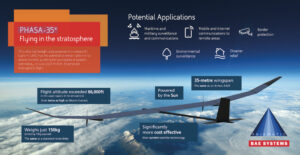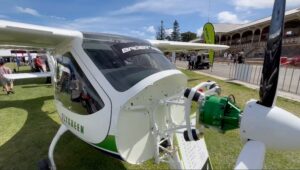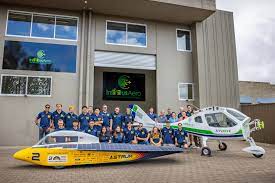Flying high and down under, Amprius, the San Francisco Bay area-based battery developer and maker, announced 450-Watt-hour per kilogram cells, and seemingly immediately secured orders from three major clients. One client of the three is a British specialist in HAPS (High Altitude Pseudo Satellite) aircraft. A probably unrelated sale went to an Australian light plane maker unveiling the country’s “first commercially produced electric aircraft,” a two-seat trainer.
BAE/Prismatic
BAE Systems has collaborated with Prismatic, a HAPS pioneer, in the development of solar-powered unmanned aerial vehicles (UAVs). The partners have crafted two prototypes of the PHASA-35 unpiloted aerial vehicle, a 35 meter (114.8 feet) span airplane weighing 150 kilograms (330 pounds) capable of carrying a 15 kilogram (33 pound) payload.
Solar cells power the craft’s electric motors during the day and charge the Amprius batteries that keep it in the air at night.
Amprius claims, “The new 450 Wh/kg cells are the only known commercially available batteries of their kind that can provide enough power and endurance for HAPS overnight stratospheric flight1 applications and enable higher payloads and/or operation in all seasons or at higher latitudes.”
Dr. Kang Sun, Chief Executive Officer at Amprius, adds, “Our new family of customizable ultra-high-energy density cells offers the ability to significantly reduce weight and increase range. Amprius is proud to support the advancement of electric mobility by delivering energy density performance that is unmatched by conventional cells available on the market today.”

Stratospheric aspirations, multiple applications
To drive home that point, a recent test flight in New Mexico saw a PHASA-35 reach 66,000 feet and return to land on the runway from which it had alighted.
Nigel Whitehead, BAE Systems’ chief technology officer, explains, “Working together with Prismatic, we’re pushing technological boundaries to develop a revolutionary solar powered aircraft at an incredibly rapid pace.
“Our investment in the company will enable us to take this technology into production, with the very real possibility that this aircraft could enter initial operations with customers within 12 months of flight trials.”
Dave Corfield, CEO BAE Systems Prismatic, notes that, “Unlike a LEO (Low Earth Orbit) satellite where they probably spend a few minutes over a point on the Earth at about 400 [kilometers] from the surface, we are 20 times nearer the ground, which gives us much better fidelity of imagery or data and very low latency of delayed signal from ground to aircraft.”
According to a report by the Royal Aeronautical Society, “The ultimate goal is a zero-emission uncrewed aircraft able of staying aloft for up to a year.”
Infinitus
Infinitus has launched a new two-seat training aircraft into the South Australian market. Co-founded by Barrie Rogers and CEO Michael Monck, the firm was formerly Bader Aero into a renamed entity with “Zero Emissions, Zero Boundaries” as its motto.
Its first product is the E22 Spark, an adaptation of the German Flight Design CTSL, part of a series flying since 1996. Teaming with battery integrator Prohelion, Infinitus has “secured battery technology from US-based Amprius” and will configure these for the E22. The energy density of 450 W-hr./kg will enable longer flight times and the cell’s manufacturing processes extend the battery’s life time.
According the company’s brochure on the E22, the airplane will begin test flights early in 2024.

Infinitus E22 with Australian motor, possibly from Monash University spin-off
Michael Monck explains the benefits. For our customers, this translates to improved capability, enhanced ability to reduce carbon emissions and an overall improved experience for them in operating aircraft in their fleets.
Rogers, current holder of several records for electric powered aircraft, adds, “Electric flight has come a long way over the last decade and this latest development in technology will continue to see Infinitus Aero push the boundaries of what is possible.” Pushing those boundaries may soon include an electric four-seat airplane, the E42 Scope. It will be interesting to see Australia provide the resources for ever bigger projects.

Solar powered racers visit the Infinitus works. Amprius powered four cars in this year’s Adelaide to Darwin solar car race.
Katie Maize Director of Strategic Accounts for Amprius concurs. “Thank you, Infinitus Aero, for partnering with us, Amprius Technologies, Inc., to power E22 Spark!”

